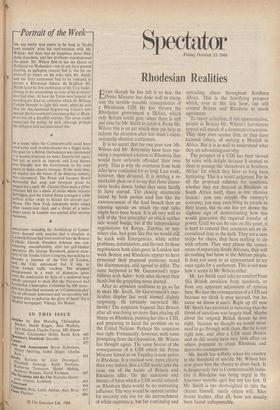Rhodesian Realities
EYEN though he has left it so late, the Prime Minister has done well to recog- nise the terrible possible consequences of a Rhodesian UDI. He has thrown the Rhodesian government a lifeline, which only Britain could give, when there is still just time for Mr. Smith to catch it. FrOm Mr. Wilson this is an act which may yet helP to redeem the situation after last week's extra- ordinarily abortive conference.
It is no secret that for one year now Mr. Wilson and Mr. Bottomley have been pur- suing a negotiated solution in Rhodesia that would have seriously offended their own party. That is why the overtures from both sides have continued for so long. Last week, however, they deviated. It is putting a re- markable gloss on it to say that those discus- sions broke down; Father they seem hardly to have started. The closing statements issued by both parties read less like the announcement of the final breach than an opening agenda on which the real talks might have been based. It is all very'well to talk of the 'five principles' on which neither side would' budge, but if the independence negotiations for Kenya, Zambia, or any- where else, had gone like this we would still be stuck with Emergencies, white settler problems, intimidation, and the rest. In those negotiations both sides gave; in London last week Britain and Rhodesia appear to have presented their prepared positions, noted the discrepancies, and agreed to differ. The same happened in Mr. Greenwood's nego-, tiations with Aden : both sides showed their hands.but the grappling never started.
After its apparent readiness, to go so far to meet Mr. Smith, the Government's inar- ticulate display last week seemed slightly surprising. (It certainly surprised Mr. Smith.) The suspicion lingered that Britain after all was doing no more than placing all blame on Rhodesia, pushing her into a UDI, and preparing to hand the problem on to the United Nations. Perhaps the suspicion was right. Fortunately, however, with some prompting from the Opposition, Mr. Wilson has thought again. The same horror of the consequences of a UDI which the Prime Minister hinted at on Tuesday is now active in Rhodesia. It is realised now, more clearly than ever before, that a UDI would take the issue out of the hands of Britain and
Rhodesia alike. On the sanctions and threats of force which a UDI would unleash on Rhodesia there would be no restraining influence. The way would-be opened neither for majority rule nor for the entrenchment of white supremacy, but for continuing and spreading chaos throughout Southern Africa. This is the horrifying prospect which, even at this late hour, can still compel Britain and Rhodesia to reach agreement.
To many articulate, if not representative, people in Britain Mr. Wilson's last-minute appeal will smack of a desperate concession. They may even accuse him, as they have accused others, of seeking a Munich in Africa. But it is as well to understand what they are advocating and why.
The prospect of a UDI has been viewed by some with delight because it seemed to them to presage the 'showdown in Southern Africa' for which they have so long been hankering. This is a weird judgment. For in all the proposed schemes for sanctions, whether they are directed at Rhodesia or South Africa itself, there is one massive lacuna : you can cripple the country's economy, you may even bring its people to their knees, but no one has yet shown the slightest sign of demonstrating how this would guarantee the required transfer of power. Until we can be sure on this point, it is hard to conceal that sanctions are an ill- considered leap in the dark. They are a sure recipe for chaos, they have nothing to do with reform. They may please the consci- ences of expatriate South Africans, they will do nothing but harm to the African people. It does not seem to us appeasement to try once again for a settlement. This is not now how it seems to Mr. Wilson either.
Mr. Ian Smith need take no comfort from this British revulsion from sanctions, or from any apparent adjustment of opinion here. We fear the consequences of a UDI not because we think it may succeed, but be- cause we know it can't. Right up till now Mr. Smith has persisted in believing that the threat of sanctions was largely bluff. Maybe about the original British threats he was right, because we thought we would never need to go through with them. But he is not right now, and after a UDI what Britain said or did would have very little effect on others prepared to crush Rhodesia and damn the consequences.
Mr. Smith has wilfully taken his country to the threshold of suicide. Mr. Wilson has now given him the chance to draw back. It is dangerously late (a Commonwealth initia- tive in Rhodesia was being urged in the Spectator months ago) but not too late. If Mr. Smith is too short-sighted to take the chance himself, surely others will.. Rho- desian leaders, after all, have not usually been found indispensable.






































 Previous page
Previous page